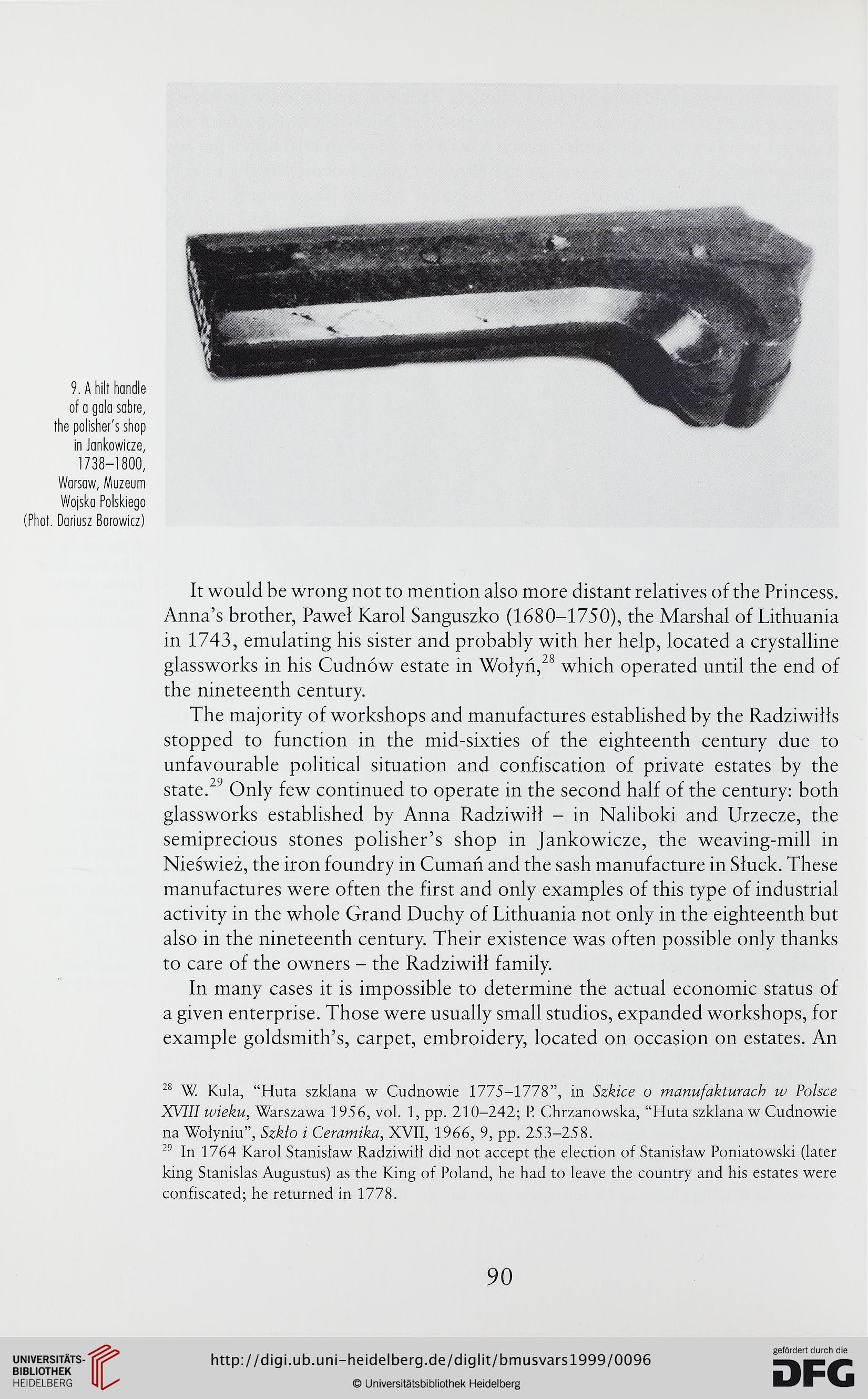9. A hilt handle
of a gala sabre,
the polisher's shop
in Jankowicze,
1/38-1800,
Warsaw, Muzeum
Wojska Polskiego
(Phot. Dariusz Borowicz)
It would be wrong not to mention also morę distant relatives of the Princess.
Anna’s brother, Paweł Karol Sanguszko (1680-1750), the Marshal of Lithuania
in 1743, emulating his sister and probably with her help, located a crystalline
glassworks in his Cudnów estate in Wołyń,28 which operated until the end of
the nineteenth century.
The majority of workshops and manufactures established by the Radziwiłłs
stopped to function in the mid-sixties of the eighteenth century due to
unfavourable political situation and confiscation of private estates by the
State.29 Only few continued to operate in the second half of the century: both
glassworks established by Anna Radziwiłł - in Naliboki and Urzecze, the
semiprecious Stones polisher’s shop in Jankowicze, the weaving-mill in
Nieśwież, the iron foundry in Cumań and the sash manufacture in Słuck. These
manufactures were often the first and only examples of this type of industrial
activity in the whole Grand Duchy of Lithuania not only in the eighteenth but
also in the nineteenth century. Their existence was often possible only thanks
to care of the owners - the Radziwiłł family.
In many cases it is impossible to determine the actual economic status of
a given enterprise. Those were usually smali studios, expanded workshops, for
example goldsmitlTs, carpet, embroidery, located on occasion on estates. An
28 W Kula, “Huta szklana w Cudnowie 1775-1778”, in Szkice o manufakturach w Polsce
XVIII wieku, Warszawa 1956, vol. 1, pp. 210-242; P. Chrzanowska, “Huta szklana w Cudnowie
na Wołyniu”, Szkło i Ceramika, XVII, 1966, 9, pp. 253-258.
29 In 1764 Karol Stanisław Radziwiłł did not accept the election of Stanisław Poniatowski (later
king Stanislas Augustus) as the King of Poland, he had to leave the country and his estates were
confiscated; he returned in 1778.
90
of a gala sabre,
the polisher's shop
in Jankowicze,
1/38-1800,
Warsaw, Muzeum
Wojska Polskiego
(Phot. Dariusz Borowicz)
It would be wrong not to mention also morę distant relatives of the Princess.
Anna’s brother, Paweł Karol Sanguszko (1680-1750), the Marshal of Lithuania
in 1743, emulating his sister and probably with her help, located a crystalline
glassworks in his Cudnów estate in Wołyń,28 which operated until the end of
the nineteenth century.
The majority of workshops and manufactures established by the Radziwiłłs
stopped to function in the mid-sixties of the eighteenth century due to
unfavourable political situation and confiscation of private estates by the
State.29 Only few continued to operate in the second half of the century: both
glassworks established by Anna Radziwiłł - in Naliboki and Urzecze, the
semiprecious Stones polisher’s shop in Jankowicze, the weaving-mill in
Nieśwież, the iron foundry in Cumań and the sash manufacture in Słuck. These
manufactures were often the first and only examples of this type of industrial
activity in the whole Grand Duchy of Lithuania not only in the eighteenth but
also in the nineteenth century. Their existence was often possible only thanks
to care of the owners - the Radziwiłł family.
In many cases it is impossible to determine the actual economic status of
a given enterprise. Those were usually smali studios, expanded workshops, for
example goldsmitlTs, carpet, embroidery, located on occasion on estates. An
28 W Kula, “Huta szklana w Cudnowie 1775-1778”, in Szkice o manufakturach w Polsce
XVIII wieku, Warszawa 1956, vol. 1, pp. 210-242; P. Chrzanowska, “Huta szklana w Cudnowie
na Wołyniu”, Szkło i Ceramika, XVII, 1966, 9, pp. 253-258.
29 In 1764 Karol Stanisław Radziwiłł did not accept the election of Stanisław Poniatowski (later
king Stanislas Augustus) as the King of Poland, he had to leave the country and his estates were
confiscated; he returned in 1778.
90




